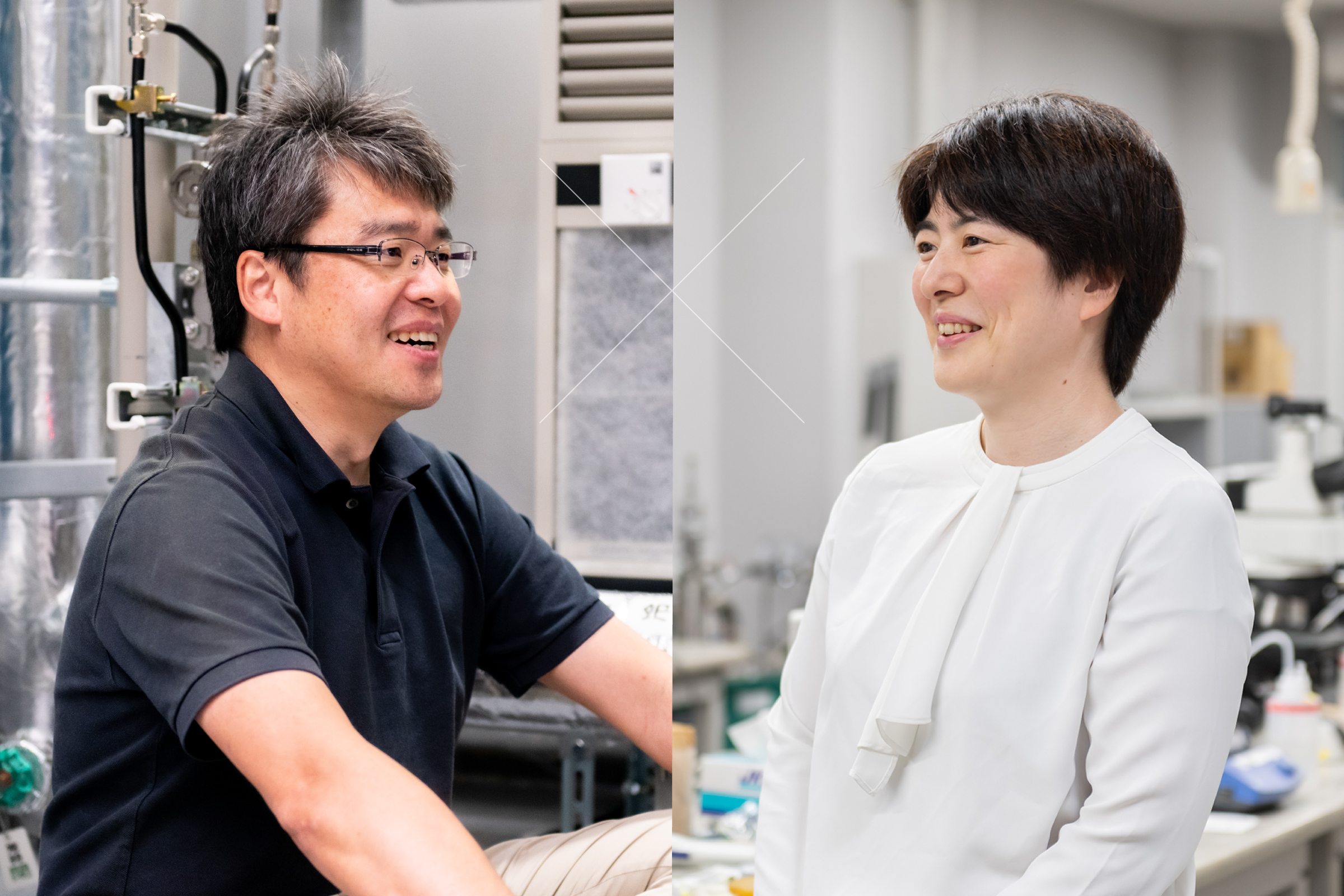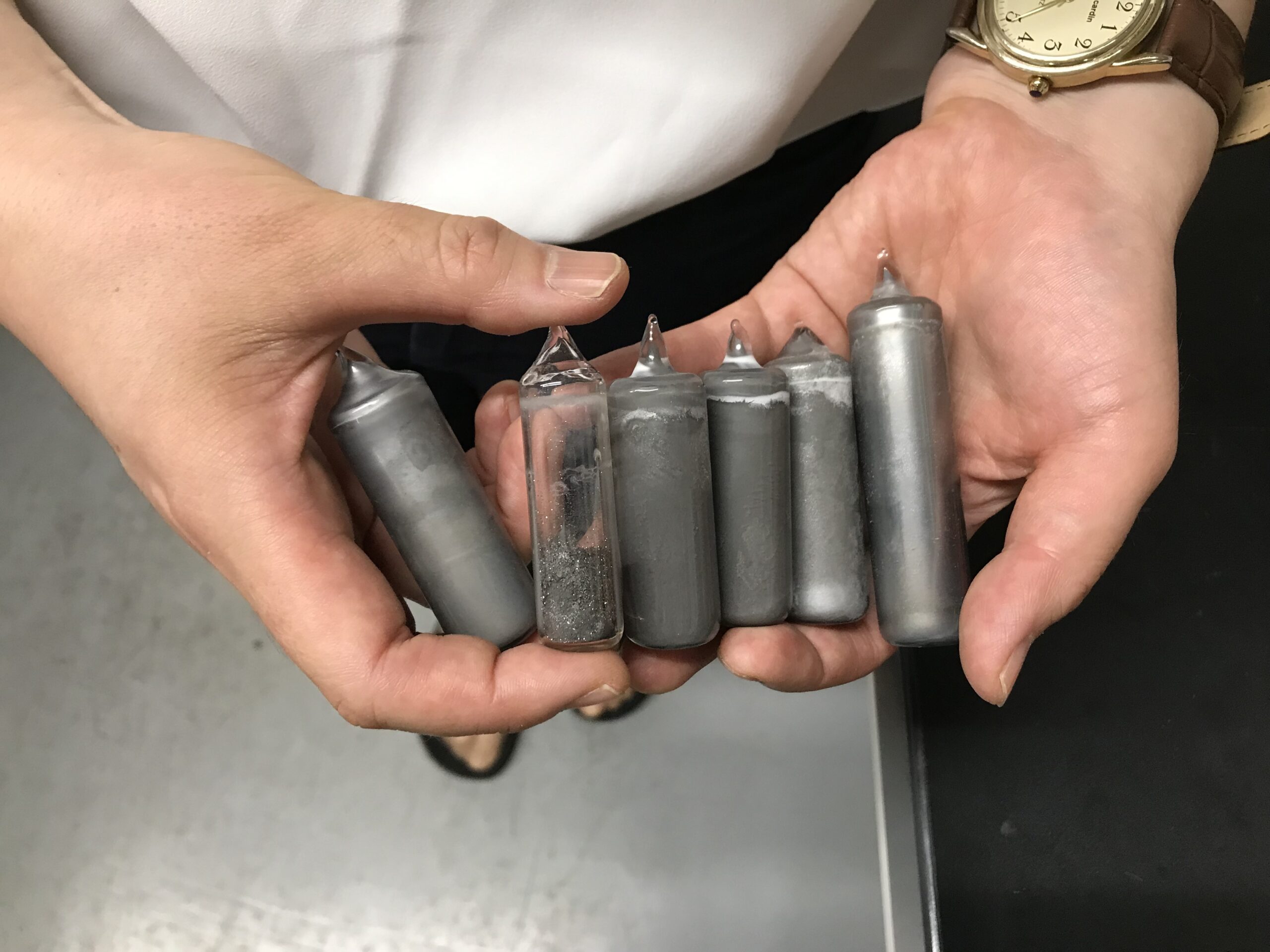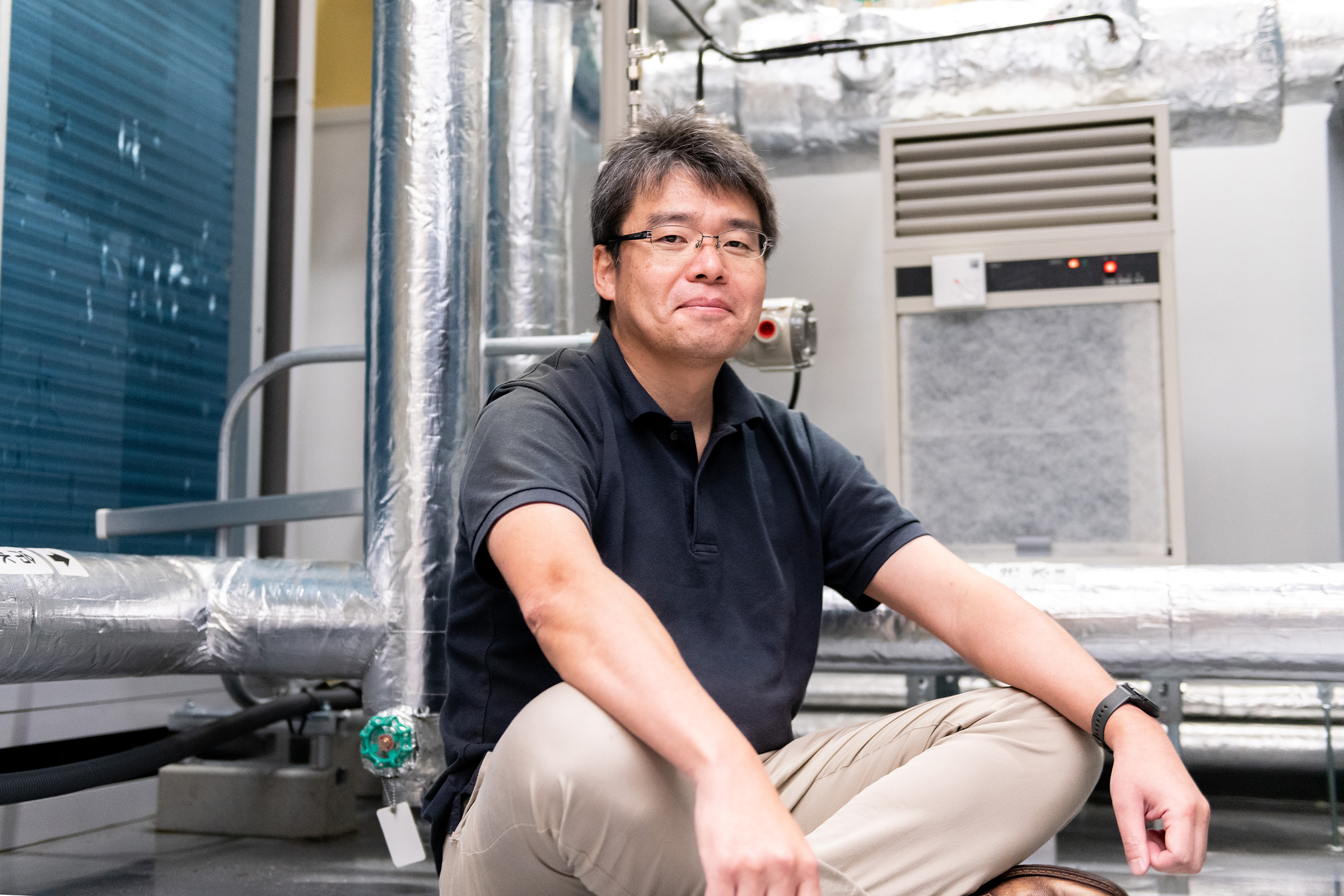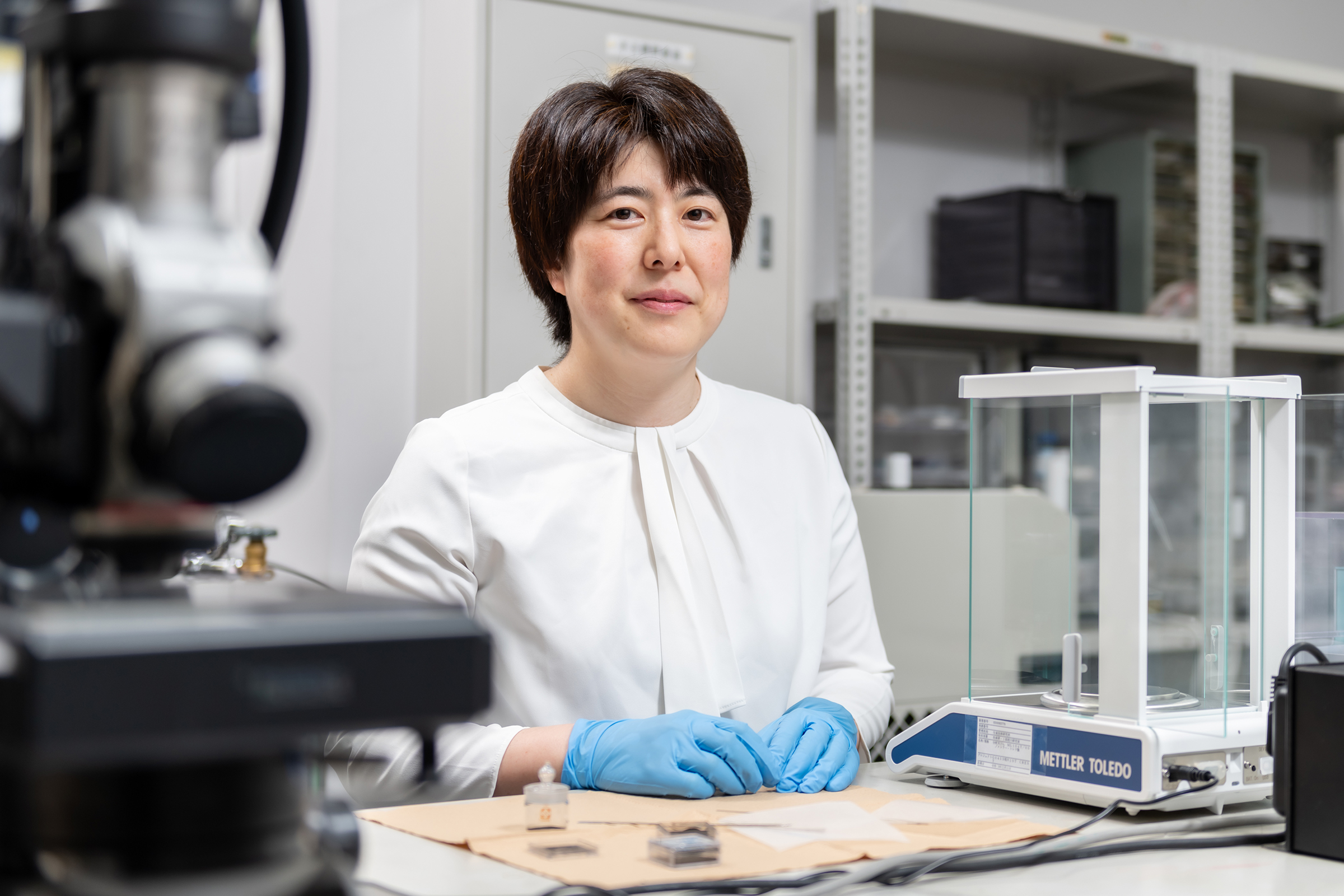Passion as Motivation. Failure Can Also be Fun!
Lecturer Yuki Tokumoto x Professor Kazuo Goda

In April 2024, we interviewed Lecturer Yuki Tokumoto and Professor Kazuo Goda of Institute of Industrial Science, The University of Tokyo, and published articles introducing their respective research in June and July. This time, we are treating our readers to a cross-talk featuring Tokumoto and Goda. What did Tokumoto and Goda, two researchers involved in the completely different fields of solid state physics and computers, learn about the other’s work and what were their respective impressions? Join us for their in-depth and energetic dialogue.
Related Article> Newly discovered superconductivity in quasicrystals, a third class of solids (Lecturer Yuki Tokumoto)
Related Article> Making computers faster at their core (Professor Kazuo Goda)
Pursuing research simply because it’s interesting
――Tokumoto conducts research related to solid state physics, particularly a third type of solid known as a quasicrystal. Goda specializes in computer system software, particularly databases. These are completely different fields but what was your impression of each other’s research?
Goda: I am a complete novice when it comes to fields like solid state physics and chemistry. The research being conducted by Lecturer Tokumoto, who discovered the superconductivity of quasicrystals, was completely new to me. More than anything, I got the impression that she is passionate about the subject of quasicrystals. I imagine you are often asked, “What benefit will that have?”. However, more important is that is finding it interesting and having the desire to know more.
Tokumoto: That’s true. I definitely find myself interested by my research. It can be difficult to conceptualize exactly what technology will be born from my work, but I have a strong desire to know more.
Goda: I feel the strong sense of desire to know more from Lecturer Tokumoto, and I find it almost enviable. However, I would say I am more or less the same. The research I am doing now is driven by my passion for computers and my desire to improve computers at their core. At the same time, I want to do something that makes other happy so I work to create something that will be utilized by society.

Each server in Goda Lab has been given its own name. Staff in charge name their respective servers after a place that has special meaning.
――The stance of passion driving research seems like an ideal approach for a researcher. At the same time, is there constant pressure to consider how your research will benefit society?
Tokumoto: There might be significant pressure because we work at UTokyo-IIS. However, my impression is that many quasicrystal researchers tend to not worry about such things. The physicist Paul Steinhardt, who proposed the concept of the quasicrystal, spent over 20 years pursuing the existence of natural quasicrystals before finally discovering them. He spent several years searching based on the hypothesis that quasicrystals might be found inside mineral samples kept in museums, and finally identified a mineral sample in a museum in Italy as being a quasicrystal. To prove that the ore was a natural quasicrystal, he went to the Kamchatka Peninsula, where the ore was excavated, to conduct an on-site survey. This led to his discovery that not only was the ore a natural quasicrystal, but that it was formed in space, and not on the Earth. In this way, this field has an environment that allows you to pursue the things you have a desire to know. I feel like that is why I am able to advance my research at my own pace. I think I have found a unique field that pursuing discovery is something that I enjoy. I don’t do well in environment with severe competition or where you’re expected to produce results immediately.
Goda: In the past, I felt a pressure to produce meaningful results. However, at UTokyo-IIS, I am allowed to work at my own pace. The work I do is related to the fundamental aspects of the field so producing a single result can take years. This is also a field that does not garner much attention. In this day and age, I feel that a place like UTokyo-IIS where I am allowed to pursue this research is both generous and rare.
The most exciting time is when I fail and think what to do next
――In your research, what aspects do you find interesting or fun?
Goda: Research is a series of failures. Achieving a single success means failure 10 or sometimes 100 times. In our world, it is common place for programming to not operate as expected, meaning we work through the night trying to fix it. To me, all research activities, including this process of failure and recovery, is fun and something I enjoy. Of course, sometimes it wears on you. However, my concentration is at its highest in those times when a program fails and I find myself rewriting code over and over again as I try to work through the problem. It’s because I enjoy times like those that I am able to work as a researcher.
Tokumoto: The idea of a series of failures applies to my work as well. Like Professor Goda, that is part of the process I enjoy. When things aren’t going well, thinking about how I can synthesize quasicrystals or improve the quality of samples can be the most fun. I enjoy such time.

Examples of trial and error by Tokumoto. The second from the left is a sample prior to heating. She has created numerous samples using combinations of different raw materials and different parameters such as heat treatment temperature and time.
Goda: Of course, I’m also happy when my research is successful. However, also being able to enjoy the times when you aren’t successful is important to being able to continue your research.
――Share your thoughts on the other person’s research and how it relates to your own future research.
Tokumoto: In the field of quasicrystals, the last few years have seen attempts to incorporate data science. In particular, with research into quasicrystal alloys, there is data on the several dozen kinds of quasicrystals already discovered, and a large database of experimental physical properties of both crystals and quasicrystals has been collected. Attempts are being made to analyze the data from this large database in order to develop better materials. I believe that the system created by Professor Goda could be utilized in our field as well. Recently, there is also research being conducted involving using machine learning to find quasicrystals with new compositions. As such research advances, it’s likely that big data will become increasingly utilized in our field so I image the correlation to Professor Goda’s research will grow stronger over time.
Goda: Data science involves specialists with the clear goal of using data to perform a certain type of analysis, but we can only be of benefit to others when we have that data. I am a computer specialist so I collaborate on data analysis but I do not try to interpret the results.
For example, in my current work involving data analysis in the health care field, I make no attempts to interpret the results. That is because I don’t actually understand the pain or struggles that people in this field experience, or what problems they are facing. It would not be very convincing for someone like me to tell health care specialists about how they should view data analysis results, and I don’t think it would have a positive impact on society. On the other hand, I can provide advice as it relates to computers. That is why I dedicate myself to that area. In other words, I think it is important that data analysis be led by the experts of those respective fields. Data scientists should insert themselves into various fields based solely on the numbers. In that sense, if researchers like Lecturer Tokumoto, who have elevated their expertise to the highest level, would like to use the systems we create to analyze their data, then I would be honored to offer my assistance as a computer specialist.
Tokumoto: I would love it if there is such an opportunity.
Valuing the fundamentals and embracing trial and error
――Lastly, please share a message for the students and younger generation of future researchers who you may one day work together as colleagues pursuing the next “Possible Future”.

Goda: I always convey to students that they should acquire knowledge that won’t betray you. We live in a world today in which all forms of knowledge can quickly be accessed via an internet search. That is why there is not much meaning in the mass acquisition of trivial knowledge. On the other hand, I believe it is important to acquire and fully understand fundamental knowledge that can serve as a foundation. Fundamentals won’t betray you. I hope that students will keep this in mind as they pursue their studies.

Tokumoto: In the field of materials science, a recent trend is to create substances efficiently by using past data. However, such a method won’t work in a situation where you don’t have data. Truly discovering something new absolutely requires examining things with your own eyes and moving them with your own hands. Efficiency is important but that can’t be the only pursuit. It is important to learn to value and enjoy the process of trial and error.
――I feel that, although working in completely different fields, Lecturer Tokumoto and Professor Goda share common fundamentals as researchers. Thank you for your time.
Laboratory website> Yuki Tokumoto
Laboratory website> Kazuo Goda


Comments
No comments yet.
Join by voting
How did you feel about the "Possible Future" depicted in this article? Vote on your expectations!
Please visit the laboratory website if you would like to learn more about this article.
Share